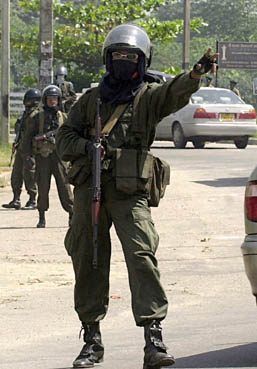Human rights groups and others are again calling for the death sentences passed on three Tamils for their alleged involvement in the assassination of Rajiv Gandhi to be commuted.
The renewed calls come after Indian President Pratibja Patil's recent rejection of their clemency pleas paved the way for their executions.
Rajiv Ghandi was assassinated in 1991 by a female suicide bomber said to be from the LTTE.
The three Tamils currently facing execution - Murugan, Santhan and Perarivalan (known by single names) - were amongst 26 people sentenced to death by a special court in 1998 for their alleged involvement.
Following an appeal the Supreme Court ruled that 19 were freed, having served their sentence, three were commuted to life sentences and only four of the death sentences were to be upheld - the three afore mentioned and Nalini, Murugan's wife.
The sentencing occurred under the Terrorist and Disruptive Activities (Prevention) Act, 1987 (TADA).
Amnesty International argues the law “contained provisions that were incompatible with international standards for fair trial.”
Human rights groups and activists have long also criticised the original trial and investigation as deeply flawed, highlighting the use of torture to elicit confessions.
This week Amnesty International called for the death sentences to be commuted and urged fellow activists and supporters to take urgent action. (See statement here).
“Amnesty International opposes the death penalty in all cases as the ultimate cruel, inhuman and degrading punishment.
“The eleven-year delay in announcing the verdict of the mercy petition and the resultant stay on death row may further amount to cruel, inhuman and degrading punishment.
“The Supreme Court of India has itself commuted death sentences in a number of cases due to prolonged delay in deciding mercy petitions.”
Last week The Hindu newspaper, a strident critic of the LTTE, also joined the protests. In an editorial titled 'No to Death Penalty', the paper argued (see full text here):
"India must make a clean break with a savage tradition by abolishing capital punishment. An immediate moratorium on executions should be the first step."
"Internationally, there is an increasing trend towards abolition, with 96 countries doing away with it and 34 countries being abolitionist in practice by observing official or unofficial moratoria on executions. Each of the three UN resolutions calling for a moratorium has seen more countries backing it".
Several parties in Tamil Nadu have also called for the commuting of the death sentences issued.
Asked for his reaction at the news of this latest rejection, DMK chief Karunanidhi said, "There are no specifics. I have always opposed death sentence. It applies to them also."
Other Tamil Nadu politicians, MDMK General Secretary Vaiko and VCK leader Thirumavalavan have expressed their condemnation of the central government's stance on the issue.
"The Centre can stop the hanging any moment and it has the powers to do so. The State Government should take steps to wipe the tears of the three accused, who were facing the gallows" said Vaiko.
Arguing that the "death itself as punishment is barbaric", Thirumavalavan accused India's central government of anti-Tamil policies influencing justice.
"The Centre has exposed its anti-Tamils stand by insisting that they should be sent to gallows" he argued.
Grass-roots Indian activists are also reported to be planning protests and vigils in order to raise awareness and exert pressure on the Indian government.
See online petition here.
The investigation and trial of Rajiv Gandhi's death was far from transparent, rights groups have long argued.
The intial police investigation into the killing, carried out by the Special Investigation Team (SIT) appinted by the CBI (Central Bureau of Investigations) accused 41 persons of involvement in the murder in 1992. The accused included three top LTTE leaders and 12 alleged LTTE cadres.
Two, including the suicide bomber - known as Thanu, died in the blast. The remaining ten alleged LTTE cadres, including Sivarasan,accused by the police of masterminding the operation, died during a police raid. The police stated the ten had committed suicide.
Twenty-six individuals were eventually brought to trial in a special court and sentenced to death in 1998. The judge reported took only two hours to decide upon the sentence.
The blanket sentencing of the accused shocked India. Lawyers for the defence lambasted it as a 'judicial massacre'.
The trial, which had occured under the TADA, came under heavy scrutiny and was criticised for its inherent secrecy, the lack of right of appeal to the High Court and that the prosecution's case had relied entirely on circumstantial evidence.
Crucially the Supreme Court later acknowledged that all 26 should never have been convicted under TADA. Although it aquitted them of all charges under that particular legistlation, the four death sentences were upheld under the crimininal conspiracy and muder provisions of the Indian Penal Code.
The SIT chief who conducted the original police investigation later admitted to the Frontline magazine, "it would have been near impossible to secure convictions without the special provisions of TADA".
Nalini's sentence was eventually commuted in 2000, following Sonia Gandhi's reported appeal to the President, K. R. Narayanan. Sonia Gandhi is alleged to have held a private meeting with the president, where she called for Nalini to be spared execution, so that her child would not be left an orphan.




